
A Nigerian-German writer Efua Traoré has been selected as one of the five regional winners for the 2018 Commonwealth Short Story Prize, from 5,182 entries and a shortlist of 24 stories.
Efua Traoré wrote a piece titled ‘True Happiness’, which described a fiction story of how “a troubled thirteen-year-old boy in Lagos questions his pastor’s definition of true happiness.”
Founded in 2012, the Commonwealth Short Story Prize is awarded annually for the best piece of unpublished short fiction and opens to Commonwealth citizens aged 18 and over.
The prizes are awarded to each of the five regional winners, each receiving £2,500 and a global winner getting an additional £5,000.
The global winner for 2018 will be announced on 25 July, at the Centre for Visual Arts and Research, Nicosia.
Traore and four other finalists – Sagnik Datta (India), Lynda Clark (UK), Kevin Jared Hosein (Trinidad and Tobago) and Jenny Bennett-Tuionetoa (Samoa) – were selected by a five-man international judging panel to represent each of the five regions of the Commonwealth.
The 2018 judges are Damon Galgut(Africa), Sunila Galappatti (Asia), Kateri Akiwenzie-Damm (Canada and Europe), Mark McWatt (Caribbean) and Paula Morris (Pacific).
The Chief Judge, Sarah Hall commended the selected writers for writing excellent stories.
“Each of the winning regional stories speaks strongly for itself in extraordinary prose and speaks for and beyond its region, often challenging notions of identity, place and society,” Hall said.






